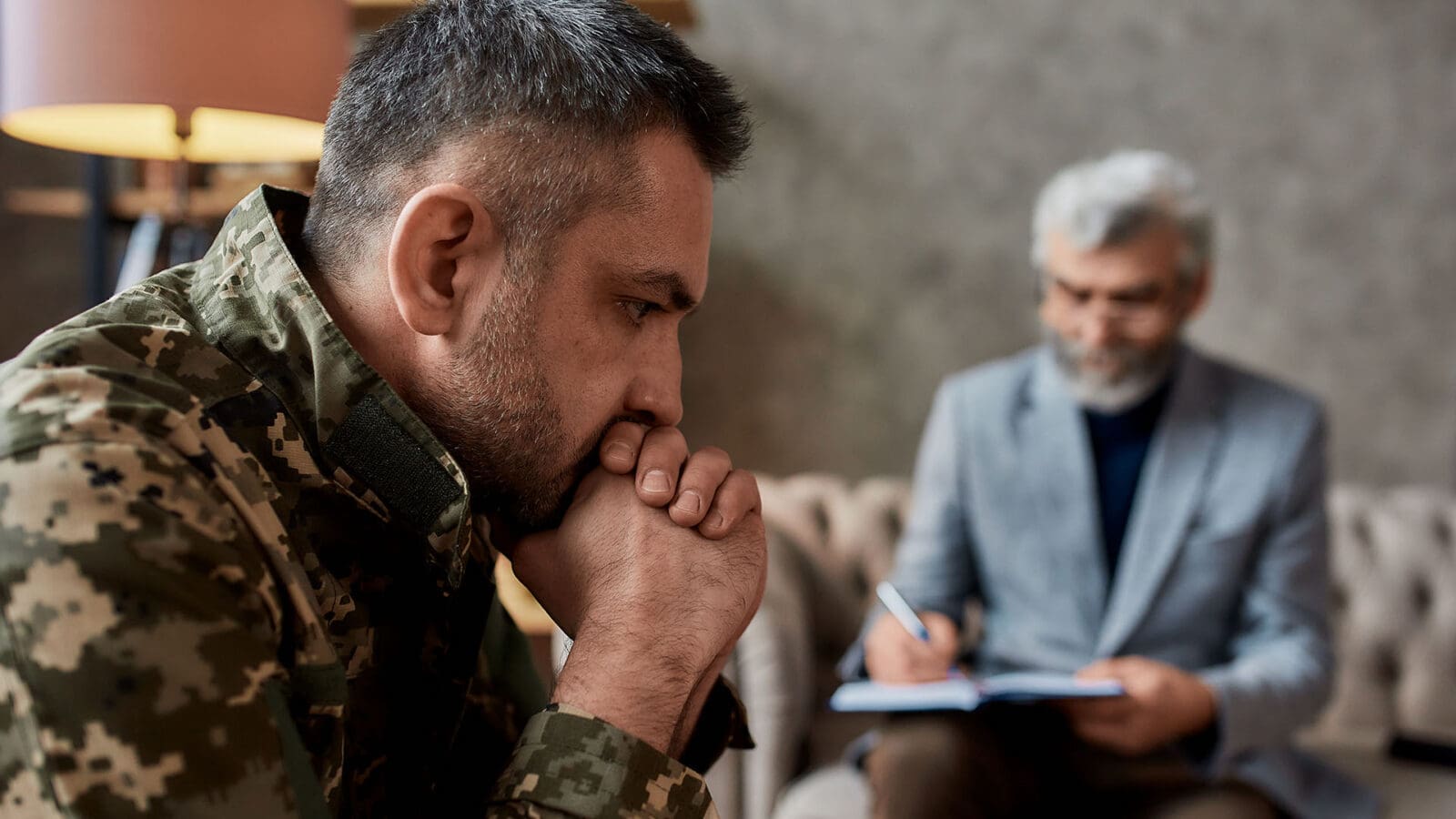Absolutely the best attorney for getting your VA benefits. After 7 years of denial, I found Brendan Garcia of VetLaw, He reviewed my case, set up a plan , scheduled my video hearing in front of a Veteran law judge, flew out to Phoenix to be there with me during the hearing. Hired a doctor to help draft a report to help my case. When all the smoked cleared, I’m now collecting max disability monthly, back pay beyond my wildest dreams. Brendan Garcia never stopped. He is an expert in Veterans law. Best decision of my life was to have him on my side. Bar none, Brendan is a terrific VA benefits attorney!
Veteran mental health claims can feel impossible to manage, especially while experiencing symptoms of a service-connected mental disorder. Our VA disability attorneys can spearhead your appeal to collect disability compensation from the VA.
Summary
- Many veterans experience psychiatric conditions such as PTSD, anxiety, and mood disorders stemming from active duty military service.
- The VA provides compensation for mental health conditions caused or worsened by military service. First, it requires veterans to provide a diagnosis and proof of an in-service cause.
- Veterans must receive a formal diagnosis, establish a connection between their mental condition and military service, and prove the condition significantly impacts their life.
- Attorneys specializing in VA claims, like VetLaw, help veterans navigate the appeals process and gather evidence to secure benefits for mental health claims.
- The VA evaluates mental health conditions holistically, assigning disability ratings based on DSM-5 criteria to determine overall disability compensation.
When most people think about disabling conditions that affect veterans, they think about physical injuries. However, many veterans suffer from silent afflictions including psychiatric conditions and other mental health issues.
In today’s military, constant deployments and other stresses place servicemembers in situations that affect them deeply, even if they don’t realize it at the time. It is not uncommon for veterans to realize many years after separating from service that they suffer from anxiety-related conditions, including PTSD.
Often, these mental conditions greatly affect their lives and their ability to function in society and the workplace. Our VA disability benefits denial attorneys assist veterans with appeals for service-connected mental health issues so they can access the compensation they are entitled to.
Set up your free consultation with us by calling (855) 739-0481 or filling out a contact form.
Disability Compensation for Veteran Mental Health Claims
The VA’s disability compensation program is designed to provide benefits to veterans who have developed PTSD or other mental health conditions either during their active duty or following discharge from the military.
If you have been diagnosed with a psychiatric condition, or if you haven’t been officially diagnosed but are seeking mental health treatment, you should consider whether your time on active duty was the cause of those symptoms.
If your provider agrees that your military service is responsible, then you should seek the help of a Veterans disability claims lawyer to discuss your eligibility to pursue veteran mental health claims.
Examples of Mental Health Concerns for Veterans
Naturally, being in combat places servicemembers at great risk of physical harm. Until recently, VA has not recognized the true impact of combat and other issues faced both during deployment and while at home has on the mental health of veterans.
Post-Traumatic Stress Disorder
Perhaps the most common mental health condition that affects veterans is post-traumatic stress disorder, or PTSD. The root causes of PTSD may result from any number of stressors or events in service, including witnessing extreme violence or trauma, or being physically or sexually assaulted.
Most veterans may decide to tough it out and do not realize they suffer from PTSD until long after they have left the service. PTSD can affect veterans in multiple areas of their lives, making it a complex disorder to deal with.
Anxiety and Mood Disorders
However, PTSD is not the only mental health condition that can affect veterans. Time spent on active duty could also result in severe anxiety disorders, depressive disorders, adjustment disorders, or a general inability to readjust to civilian life, among others.
VetLaw’s team of experienced attorneys are available to discuss the experiences you had on active duty and how to establish a medical nexus between those events and your current mental health problems.
VA MENTAL HEALTH RATINGS: UNDERSTANDING THE BASICS
How to Pursue a Claim for Disability Based on Mental Health Concerns
To qualify for VA disability benefits, a veteran must be able to prove that the event or stressor that led to the condition occurred while on active duty, and that the condition now has a significant impact on their life.
You will need to go through this process to successfully claim VA disability benefits for a mental health disorder:
1. Receive a Diagnosis
The VA generally requires a medical diagnosis from a licensed healthcare professional before it will move forward with a mental health claim. You will likely need to see a psychologist, psychiatrist, or another type of mental healthcare provider to receive a diagnosis.
Adding other medical records, such as which prescriptions you are taking, can be helpful to the VA as it assesses the severity of your mental health condition.
2. Identify the In-Service Cause
With veteran mental health claims, one of the biggest obstacles tends to be the in-service trigger. Providing detailed information on the events from service will be helpful in establishing proof of the incident that happened while on active duty.
Being wounded in combat or witnessing a fellow servicemember be wounded or killed is not the only type of event involving extreme violence which may serve as a veteran’s stressor.
Unfortunately, many servicemembers may be physically or sexually assaulted while on active duty. Veterans may also suffer exposure to other traumatic events that can serve as the basis for a psychiatric diagnosis.
3. Connect Your Mental Health to Your Military Service
Although showing a nexus, or connection, between your current mental health symptoms and an event or events on active duty is required, sometimes your VA mental health records may contain enough information to establish this vital link.
Other times, a psychiatrist or psychologist experienced in working with attorneys may be able to assist with proving the connection. Either way, VetLaw’s experienced attorneys can help you gather evidence to pursue successful veteran mental health claims.
Discover How VetLaw Can Help With Veteran Mental Health Claims
The effects of a mental health disorder or condition can seep into every area of your life, compromising your ability to maintain your relationships, career, and health. VetLaw can serve as a reliable and valuable source of legal advice as you appeal your VA disability claim for a service-connected mental condition.
As a veteran-run law firm, we understand how pervasive mental health issues are among former service members. We also know how to effectively approach the VA to get compensation for veteran mental health claims.
Schedule a free consultation by calling (855) 739-0481 or filling out a contact form.
Can I claim a mental health condition as a secondary disability to a physical injury or illness?
Mental and physical health issues are often intertwined. Therefore, it is not uncommon for veterans with chronic or catastrophic injuries and illnesses to develop psychological conditions like depression following a health crisis.
One mental health condition can also serve as a catalyst for another psychological condition. The VA recognizes veteran mental health claims for psychological disorders that arose or worsened as a consequence of an illness or injury directly related to military service.
Veterans must still present a formal diagnosis and convincing evidence of a medical nexus between the conditions to secure VA benefits.
How does the VA rate mental health conditions?
Instead of evaluating a veteran’s mental health conditions separately and providing a rating for each diagnosis like they generally would for multiple physical disabilities, the VA evaluates a veteran’s mental health as a whole.
There is one Ratings Schedule for Mental Disorders that covers the majority of psychological conditions the VA compensations. A second Ratings Schedule for eating disorders also exists. When the VA assesses a veteran’s mental health, it compares their symptoms to the criteria in the appropriate rating schedule.
Then, it assigns a rating based on the percentage of disability that matches their symptoms. The VA combines this rating with any other ratings for physical disabilities to form an overall VA disability rating.
What is the VA Ratings Schedule for Mental Disorders based on?
The VA generally aligns its ratings schedule for veteran mental health claims with the DSM-5. The DSM-5 is widely considered the authority on diagnosing mental disorders.











